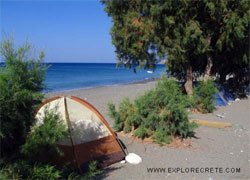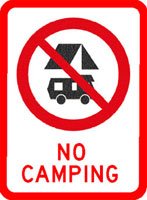Free camping in Greece should be legal
 The idea of free camping in Greece with the thousand beaches sounds great and idyllic, even in times when the notion of safety, hygiene and control are rather predominant in the world.
The idea of free camping in Greece with the thousand beaches sounds great and idyllic, even in times when the notion of safety, hygiene and control are rather predominant in the world.
The image is enough on its own to convince you: you set a tent on any beach you like, you wake up in the morning, you enjoy your swim by yourself in the sea, you relax and unwind on the beach all day long and in the night you fall asleep with the sound of waves breaking next to the tent. And all these after an intimate and magical night around the fire…
However, when you camp in the nature, not everything is as idyllic as it seems. Tents may be drifted by the strong wind, there are many prohibitions in several areas and you might be chased by the police, and the majority of conveniences as we know them are simply inexistent. You can find restrooms in just a few beaches, there is no water, in the night you freeze because of humidity and communication is difficult because mobile phones have no signal.
Is free camping a way to rest or a hassle? Why some people choose to deny the comforts of a modern guestroom in a hotel in Greece, or the basic facilities of an organized camping? And in addition risking controls by officers? Is it a matter of thinking or is it all about money?
The response to this question probably includes both options: cheap and affordable holidays for some people, while others find a motivation to come close to nature. Some choose the organized beaches in Greece that offer them facilities and conveniences in close proximity, while others prefer more pristine and remote beaches, one can reach on foot; these beaches offer the more genuine version of living by the nature.
Whatever the preferences of the campers in Crete and Greece in general, it is certain that these groups of people do not refer to the hippies of the past – the ones we have seen in Crete during the past decades – but consist of people from every social and educational level and status.
 However, free camping in Crete and other areas in Greece has become subject of controversy and debates lately. According to the laws 392 of 1976 and 2160 of 1993, free camping is prohibited in Greece. It is also prohibited to the land owners to host more than one trailer and caravan on their land. The latter refers mostly to owners of beach side restaurants who offer free camping in their property.
However, free camping in Crete and other areas in Greece has become subject of controversy and debates lately. According to the laws 392 of 1976 and 2160 of 1993, free camping is prohibited in Greece. It is also prohibited to the land owners to host more than one trailer and caravan on their land. The latter refers mostly to owners of beach side restaurants who offer free camping in their property.
These prohibitions and limitations have raised some reactions from people who claim their right to set up their camping tent freely, and enjoy the sun and sea without fearing the police and the penal sum which is quite high (150€).
In July in Chania a small feast for free camping was organized by several associations and clubs, that denoted that free camping is a right.
The announcement regarding the feast – demonstration for free camping in Greece
“Man has always been considering his undeniable right to enjoy nature, but today such thing is considered illegal. The limitation of vital space and freedom is expanded to beaches and vacation. The law 392/1976 suggests that it is prohibited to set up tents or park caravans in archaeological sites, beaches, edges of forests, forests and communal areas in general.
This irrational prohibition of free camping in Greece uses as an excuse the protection of the environment from pollution and wildfires. Practically the examples from areas such as Zacharo in the Peloponnese, the island of Tilos, the island of Gavdos in Crete and other examples throughout Greece depict that free campers are the actual guardians of the natural habitat, enjoying at the same time the support of the local community.
Unfortunately the prohibition of free camping doesn’t help us learn how to be responsible campers and protect the environment. This is why we organize in Chania a colorful feast, to claim the right to enjoy nature with responsibility.
- Read the response of the Association of Camping Owners of Crete
- Camping in Greece, directory with camping sites in Crete and other places in Greece